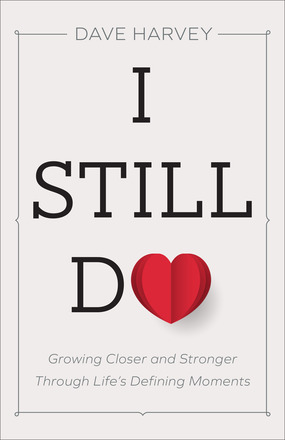We count marriages in years, but they’re really defined by moments. And usually not the picture-perfect ones. We tend to enjoy recounting the early moments—when we met, when we got engaged, when we said “I do.” While those moments are necessary for the formation of a marriage, the ones that come later tend to have more effect on the health and duration of a marriage.
What about the moments when parenting is hard, or we face financial struggles, or we receive a difficult diagnosis? As Dave Harvey—president of Great Commission Collective—explains in his new book, I Still Do: Growing Closer and Stronger through Life’s Defining Moments, there are “unique points of trouble and transformation that visit us as our marriages mature” (17). This work is, in many ways, a natural sequel to Harvey’s popular 2007 book, When Sinners Say ‘I Do’: Discovering the Power of the Gospel for Marriage.
Trouble
Couples who’ve been married for any time at all know that troubles are a part of marriage. But how we view the source of trouble and our response to it can have great implications for our marriages. One of Harvey’s foundational and most helpful points is that “brokenness is broader than sin,” so the fact that sin is “our biggest problem” doesn’t mean sin is “our only problem” (25). Harvey explains that we need to understand ourselves and our spouses in a holistic way.

I Still Do: Growing Closer and Stronger through Life's Defining Moments
Dave Harvey
I Still Do: Growing Closer and Stronger through Life's Defining Moments
Dave Harvey
With 37 years of marriage and 33 years of pastoring under his belt, Dave Harvey has identified those life-defining moments of a post-newlywed marriage. He wants to help couples recognize them in their own relationships so that they can take a proactive, godly approach to resolving conflicts, holding one another up as change inevitably happens, and ensuring that their marriage survives and thrives.
Whether your relationship is maturing gracefully, just needs a tune-up, or you and your spouse are locked in conflict and your future seems uncertain, Dave Harvey has encouragement and practical tools to help strengthen what remains and build a rock-solid union for the days to come.
Drawing from David Powlison, he illustrates the whole person as a set of concentric circles with the human heart in the center. Our hearts, and the sin in them, don’t exist in isolation—they’re, first of all, physically embodied. Some of our troubles in marriage are related to our imperfect bodies that don’t always work as they should, especially as we age.
In addition, our hearts and our bodies are socially embedded. Whether we grew up in poverty or a middle-class home, whether we were raised by one parent or two, whether our childhood was stable or chaotic, all contribute to who we are and how we interact in our marriages.
Moving out another ring in the circle, Harvey explains that our hearts are also spiritually embattled. “There are things at work in us that go way beyond nature or nurture,” he writes. “If we are going to be truly biblical in examining other people’s acts and omissions, we must not overlook this unpopular category of spiritual attack” (35).
We count marriages in years, but they’re really defined by moments. And usually not the picture-perfect ones.
But lest we be discouraged by these various sources of trouble, the final circle encompassing all the others is God’s providence. Every aspect of who we are and who our spouse is, along with all our defining moments, “lovingly tucked within the care of God’s astounding providence” (37).
Transformation
With this foundation, Harvey discusses particular defining moments common to couples who’ve been married a decade or more. From more general moments like blame and suffering, to specific ones like sex changing with age and kids leaving the home, he engages a range of challenges we will likely face.
But Harvey doesn’t just identify these so we’ll recognize when we’ve reached a defining moment in marriage (though that’s a good first step). Rather, he helps us see how they’re opportunities for transformation. He shows us that defining moments are “an invitation from God to transform the core of our being and to deepen our intimacy with our spouse” (22).
So for those of us only a decade or so into marriage and just beginning to hit these defining moments, Harvey’s book is an invaluable resource that could save us a lot of heartache. We have a guidebook for how to meet the Lord and our spouse in these defining moments so that they become opportunities for positive transformation.
The real power in Harvey’s book isn’t so much in helping us see what kinds of moments will likely define our marriages, but in showing us how the gospel meets us in those moments and informs the way we respond to our spouses.
But what about the couples who’ve seen many of these moments come and go? What if, as Harvey writes with a bit of humor, we have “regrets orbit[ing] around [us] like the paparazzi circling the British royal family” (166)? What do we do then? The same thing we do in all the defining moments of marriage—we look to the gospel. Harvey writes:
We can live and lead with hope even amid broken dreams—not because we will get it all right but because we follow a Savior who did. Only from that cradle of security can we admit selfishness, loneliness, and regrets. And from that humble posture we can lift our eyes to the One who promises to take even what we perceive as losses and griefs and make them into something beautiful. (167)
The real power in Harvey’s book is not so much in helping us see what kinds of moments will likely define our marriages, but in showing us how the gospel meets us in those moments and informs the way we respond to our spouses. None of us knows what path our own marriage will take and which moments will truly define it. We can’t anticipate how we and our spouse may change, and “we can’t know the five to six different people they will become over the next 50 years of life” (168).
But if we’re defined by our relationship with the One who is the same yesterday, today, and forever, we can trust him to use our marriages to transform us more and more into Christ’s likeness. We can trust he’s using our earthly marriages to prepare us for our eternal one. Though in our wedding vows we say “I do,” marriage is really more about what the Lord will do as we seek him moment by moment, letting our marriages be ultimately defined, not by our troubles, but by gospel truth.

































